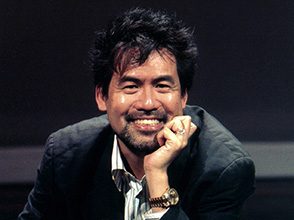 Rejoice, readers, for the Second Laird Miscellany brings you an interview with guest lecturer and famous playwright David Henry Hwang in preparation for his visit to Carleton! Mr. Hwang is best known for his Tony Award-winning play, M. Butterfly, and has explored an expansive array of mediums in his career. This Thursday, January 26th, at 6:00 in the Weitz Cinema, Mr. Hwang will be giving a talk called “Authenticity and its Discontents,” and we encourage you all to attend this lecture! Additionally, to be a bit more prepared to fully appreciate this opportunity (and how often are we going to get serious celebrities parading around campus?!), check out the interview below, which grants a small peak into his head. This editor can scarcely believe we managed to get an interview with Mr. Hwang, so I hope you all can delight in this moment along with me.
Rejoice, readers, for the Second Laird Miscellany brings you an interview with guest lecturer and famous playwright David Henry Hwang in preparation for his visit to Carleton! Mr. Hwang is best known for his Tony Award-winning play, M. Butterfly, and has explored an expansive array of mediums in his career. This Thursday, January 26th, at 6:00 in the Weitz Cinema, Mr. Hwang will be giving a talk called “Authenticity and its Discontents,” and we encourage you all to attend this lecture! Additionally, to be a bit more prepared to fully appreciate this opportunity (and how often are we going to get serious celebrities parading around campus?!), check out the interview below, which grants a small peak into his head. This editor can scarcely believe we managed to get an interview with Mr. Hwang, so I hope you all can delight in this moment along with me.
You’re coming to Carleton College soon to talk about your “search for cultural and artistic authenticity”; can you briefly explain what this means to you?
I feel I began my career several decades ago in an America where almost all the images and portrayals of people who looked like me bore no resemblance to the way I perceived myself, nor those of similar background around me. So as an artist, I set out to discover and create more authentic stories and characters. Along this road, I’ve learned that “authenticity” is more complicated than I imagined when I began.
Which stories are you most excited to tell? Are there perspectives you’ve been meaning to explore that you haven’t gotten to yet?
I’m most excited to tell stories which allow me to ask a question I want to explore, while at the same time taking on a new formal challenge as a playwright. For instance, CHINGLISH asked about the degree to which misunderstanding characterizes the U.S.-China relationship, while giving me the chance to create a bilingual comedy in English and Chinese.
The New Yorker has lauded you as “the most successful Chinese-American playwright this country has produced” – does the weight of this acclaim impact the way you pursue your career?
Over the course of my career, there’ve been times when I felt I had a responsibility as an Asian American writer to continue exploring this material. However, I’ve come to realize that the most important responsibility I have is to write the best plays I can. It does happen, however, that for whatever reason, I often come back to exploring East-West issues, which apparently continue to fascinate me most deeply.
Most of your works have been either plays or scripts for TV shows; what do you think is special about the stage (or the set, as the case may be) versus a purely literary text?
I’ve never been good at writing prose. I like creating a world which comes to life physically and unfolds over time, I like collaboration, and I like show business. So scriptwriting has proven the best fit for me.
If you had to pick, who are the literary figures that have had the greatest impact on your life? Why?
My two most important influences are probably Sam Shepard and Maxine Hong Kingston. Sam, because he helped me understand the relationship between myth and realism, and because I had the opportunity to study with him. Maxine helped me understand that same relationship, but from the standpoint of an Asian American author, and was also encouraging to me as a young dramatist.
It is said that after Chekhov saw the first production of his play, The Seagull, he walked out of the theater determined never to write again because of how brutally it had been butchered. Do you find it difficult as a playwright to put your work into the hands of others? How do you approach the complexities of collaboration when putting on a show?
I love collaboration and I love seeing what other artists do with my texts. For a show’s first production, I work very closely with the director, to create a template which satisfies us both. Afterwards, however, I’m pretty open to directors’ visions, assuming they don’t try to change the text.